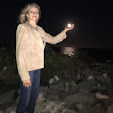I do listen to gardening podcasts, buy way too many books about homesteading and devour magazines like Mother Earth, to make up for what I'd be learning if I were gardening all this time. If how stunningly I've failed in my efforts to keep the most basic container plants on my porch (I've even watched those bamboo shoots that require only a little water, no sun, no soil expire under my care) is any prediction of my abilities as a real gardener, then I would be among the pilgrims to die in the first winter in New England. I figure I will give myself 5 years once I get my hands in some soil to discover if I have what it takes or if I'm doomed to go to my grave a hopeless black thumb. So I need all the pre-study and experience that I can get.
It's not just gardening I'm interested in learning, but canning and preserving, bread baking, and other lost arts. There is a resurgence of interest in these things so I am hardly unique. But I claim to be apart from the hoards of former Yuppie urbanites who have cashed in their stilettos and nightclubs in search of a retro existence. They are mostly motivated by their babies, which certainly rips the needle off the record of the world that had been their formerly delicious, city life.
While my world may have consisted more of sparkly earrings, champagne and tall buildings, I have long been fascinated by people like the late Tasha Tudor, who had enough success to live as she wanted. She created her own world on her sprawling estate living with little or no electricity, cooking over a wood stove, sleeping in a cap, walking barefoot -- self sufficient well into her 90's.
And I am of the generation who read Little House on the Prairie and felt something shift when I read about their preparations for the winter: smoking, drying, cold storage, metering supplies to make it until the Spring came again. Those few long trips to the store in a town far away. Coming back with precious flour, sugar, coffee, a measure of fabric, and a few pieces of peppermint candy, among other treasures. Building fires that would burn all night, saving embers to start the stove in the morning. I still pull it out late in the Fall, between Thanksgiving and Christmas and read those parts and get completely lost in the pages.
Some people stick things in the ground, tend to it and harvest for the table, without much else to tell. I know several of these aliens. Their gardens burst forth with color and abundance. Everything they try - cumquats, persimmons, even cantaloup and corn by the walk - thrives. But I hear far more stories of the difficulties -- chronic destruction of tender shoots or worse -- of prized meager successes that are decimated just before harvest -- by one or another critter, bug or disease. Those with the best of intention to deal with these organically or by companion planting at the start end up in spraying the shit out of the everything with the strongest chemicals sold this side of the war or find themselves sitting in trees with night vision goggles and a rifle to finally kill the damn thing that ate all the corn/tomatoes/beans the night before picking.
Which, I wonder, will I be?














